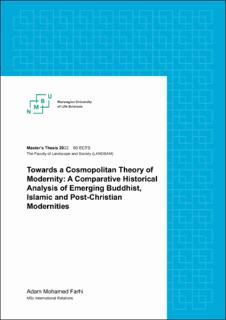| dc.description.abstract | Current theories of modernity, an international phenomenon, have been criticized for being Eurocentric, and attempts to address their problem of Eurocentrism are at best semi-Eurocentric. This thesis suggests a new theory of modernity, the Theory of Transhistorical Modernity (TTM), that is arguably more empirically robust and, being non-ethnocentric and cosmopolitan, normatively sounder. Taking an interdisciplinary approach, this theory is underpinned by a rethinking of the dichotomies of tradition/modernity, religion/secularity, and collectivism/individualism. This thesis takes a historical–sociological International Relations approach to the study of modernity, employing the comparative historical methods for data collection and analysis. Through the lens of this new theoretical framework, the post-Christian nationalist modernity is but one among many modernities in history. Out of this plurality, three cases are selected, analyzed, and then compared to illustrate the theory and reach a better understanding of modernity in general and of these cases in particular: Axial Buddhist modernity (6th–3rd centuries BCE), early Islamic modernity (7th–13th centuries CE), and the post-Christian nationalist modernity (17th–20th centuries CE). Analysis of these cases shows that modernity is a transhistorical phenomenon with different historical manifestations. Early Buddhism and early Islam, for instance, are not the antitypes of Western modernity but were themselves modernities. Through this new theory, I argue that intercultural influence is transhistorical, and the agency to enact innovative social change or modernize is not a Western invention but a transhistorical human capacity. TTM reclaims the West’s theft of the cosmopolitan, transhistorical value and agency of modernization. | en_US |

